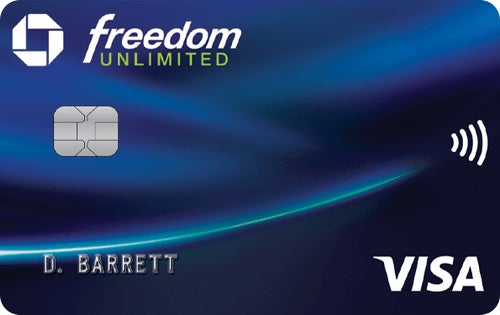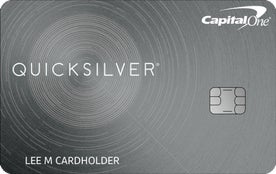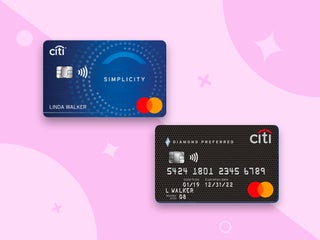Summary
The Chase Freedom Unlimited and the Capital One Quicksilver Cash Rewards Credit Card are two cash back credit cards that take a unique approach when it comes to how they award points.
The content on this page is accurate as of the posting date; however, some of our partner offers may have expired. Please review our list of best credit cards, or use our CardMatch™ tool to find cards matched to your needs.
Cash back credit cards let you earn a percentage of rewards based on your spending, but the way they dole out cash back varies from card to card. For example, some cards offer bonus rewards in categories that change each quarter, while others offer a flat rate of cash back for each dollar you spend. Some cards even take on a hybrid approach, offering a flat rate of rewards on regular spending and bonus rewards in specific categories that you may spend a lot in, such as groceries or gas.
The Chase Freedom Unlimited® and the Capital One Quicksilver Cash Rewards Credit Card are two cash back credit cards that take a unique approach when it comes to how they award points. In this guide, we’ll compare them so you can decide which one would be better for your wallet.
Chase Freedom Unlimited vs. Capital One Quicksilver
 |  | |
| Rewards rate |
|
|
| Welcome bonus | Earn an additional 1.5% cash back on everything you buy (on up to $20,000 spent in the first year) | $200 bonus when you spend $500 in first 3 months |
| Annual fee | $0 | $0 |
| Foreign transaction fees | 3% of each transaction | None |
| Introductory APR offer | 0% intro APR on purchases and balance transfers for 15 months, followed by a variable APR of 16.49% to 25.24% | 0% intro APR on purchases and balance transfers for 15 months, followed by a variable APR of 16.49% to 26.49% |
Earning points
When it comes to earning rewards, the Chase Freedom Unlimited will definitely leave you better off. Both credit cards offer a rate of 1.5% cash back on all regular purchases, but the Chase Freedom Unlimited also lets you earn 5% back on travel booked through Chase Ultimate Rewards and 3% back on dining and drugstore purchases.
Since most people spend at least some money on dining and drugstore purchases each year, the Chase Freedom Unlimited will almost certainly leave you with a bigger rewards haul over time.
Redeeming points
When it comes to redeeming your rewards, you’ll have several options with either card. The Capital One Quicksilver lets you redeem your rewards for cash back or gift cards, but you can also apply your rewards as a statement credit to your account. In addition, you can now use the cash back rewards from this card to cover purchases made through PayPal or Amazon.com.
The Chase Freedom Unlimited card lets you cash in your rewards for cash back, statement credits, merchandise, gift cards and travel through the Chase Ultimate Rewards portal. Though the Freedom Unlimited is known as a cash back card, its rewards actually come as Ultimate Rewards points. If you have a premier travel rewards credit card from Chase, such as the Chase Sapphire Preferred® Card, you can even pool all your Chase points, accrued from multiple cards, into one account for discounted travel redemptions or transfers to Chase airline and hotel partners.
Bonus perks
These two cash back credit cards from Chase and Capital One both come with a surprising number of benefits for cards with no annual fees. With the Freedom Unlimited, for example, you’ll get purchase protection against damage or theft, as well as extended warranties on items that come with a manufacturer’s warranty. You’ll also get travel perks like travel and emergency assistance services and secondary auto rental coverage. One big standout benefit also comes in the form of trip cancellation and interruption insurance, which is worth up to $1,500 per covered person and up to $6,000 per covered trip.
The Capital One Quicksilver comes with a slightly less generous suite of benefits. As a cardholder, major perks you’ll enjoy include travel accident insurance, extended warranties and 24-hour travel assistance. The Quicksilver also comes with Capital One’s CreditWise credit monitoring service.
Annual fee, foreign transaction fees and authorized users
Neither of these cash back cards charge an annual fee, which is good news. However, the Capital One Quicksilver Cash Rewards card could be a better option if you travel abroad. While the Chase Freedom Unlimited charges a 3% foreign transaction fee on all purchases made outside the United States, the Capital One Quicksilver doesn’t charge a foreign transaction fee.
Also, be aware that both cards let you add authorized user cards to your account for free.
Introductory APR offers
If you want access to a low introductory APR for a limited time, both cards are worth looking into. The Chase Freedom Unlimited card gives you an introductory 0% APR on purchases and balance transfers for 15 months, followed by a variable APR of 16.49% to 25.24%.
The Capital One Quicksilver offers an introductory 0% APR on purchases and balance transfers for 15 months, and then a variable APR of 16.49% to 26.49% after that intro period when you carry a balance from month to month.
Chase Freedom Unlimited: Best for Chase loyalists and everyday spending
As previously mentioned, the Freedom Unlimited really shines when paired with other Chase cards, to pool together points and even redeem points at a higher value (with the Chase Sapphire Reserve® points redeemable at 1.5 cents apiece) when booking trips through Chase Ultimate Rewards. However, even on its own, the Freedom Unlimited’s various bonus categories at restaurants and drugstores make the card an easy choice as you go about your everyday spending. Overall, it continues to stand out as one of the best cash back cards on the market.
Capital One Quicksilver: Best for small credit debt and the no-fuss spender
Other than its fairly achievable sign-up bonus, the Capital One Quicksilver stands out as a cash back card with a reasonable intro APR offer. Perfect for cardholders with some credit card debt, the card gives you 15 months to pay off your old balances and even gives you breathing room for any new purchases you may make during the intro period. However, the introductory APR only last 15 months and the Quicksilver charges a 3% transfer fee, so it’s not ideal for large balance transfers.
Other than that, the Quicksilver’s flat rate 1.5% cash back is nothing to scoff at if you don’t like to think about bonus categories and prefer to swipe a single card for most or all your purchases. It’ll serve you well as your main card and will probably surprise you by earning cash back quicker than you think. It’s also excellent for traveling abroad as it doesn’t charge a foreign transaction fee.
Bottom line
If you’re considering a new cash back credit card, Chase and Capital One both have good options with their Freedom Unlimited and Quicksilver cards. However, the Chase Freedom Unlimited is probably better if you spend a lot in everyday categories like dining and drugstores, or if you have a travel credit card from Chase, as well. This card is also a good option if you want to pay down your purchases with a low APR for a limited time.
On the flip side, the Capital One Quicksilver is geared toward users who want to earn rewards on their spending without any foreign transaction fees. And its 1.5% cash back on all purchases will earn you cash back rewards at a slow and steady pace.
If you’re not quite ready to choose, you can also compare these two cards to other top rewards credit cards on the market today.
Editorial Disclaimer
The editorial content on this page is based solely on the objective assessment of our writers and is not driven by advertising dollars. It has not been provided or commissioned by the credit card issuers. However, we may receive compensation when you click on links to products from our partners.





